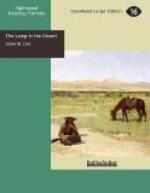It was a fortnight after the wedding, on an evening of intense heat, that Everard Monck, now established with Tommy at The Green Bungalow, came in from polo to find the mail awaiting him. He sauntered in through the verandah in search of a drink which he expected to find in the room which Stella during her brief sojourn had made more dainty and artistic than the rest, albeit it had never been dignified by the name of drawing-room. There was light green matting on the floor and there were also light green cushions in each of the long wicker chairs. Curtains of green gauze hung before the windows, and the fierce sunlight filtering through gave the room a strangely translucent effect. It was like a chamber under the sea.
It had been Monck’s intention to have his drink and pass straight on to his own quarters for a bath, but the letters on the table caught his eye and he stopped. Standing in the green dimness with a tumbler in one hand, he sorted them out. There were two for himself and two for Tommy, the latter obviously bills, and under these one more, also for Tommy in a woman’s clear round writing. It came from Srinagar, and Monck stood for a second or two holding it in his hand and staring straight out before him with eyes that saw not. Just for those seconds a mocking vision danced gnomelike through his brain. Just at this moment probably most of the other men were opening letters from their wives in the Hills. And he saw the chance he had not taken like a flash of far, elusive sunlight on the sky-line of a troubled sea.
The vision passed. He laid down the letter and took up his own correspondence. One of the letters was from England. He poured out his drink and flung himself down to read it.
It came from the only relation he possessed in the world—his brother. Bernard Monck was the elder by fifteen years—a man of brilliant capabilities, who had long since relinquished all idea of worldly advancement in the all-absorbing interest of a prison chaplaincy. They had not met for over five years, but they maintained a regular correspondence, and every month brought to Everard Monck the thin envelope directed in the square, purposeful handwriting of the man who had been during the whole of his life his nearest and best friend. Lying back in the wicker-chair, relaxed and weary, he opened the letter and began to read.
Ten minutes later, Tommy Denvers, racing in, also in polo-kit, stopped short upon the threshold and stared in shocked amazement as if some sudden horror had caught him by the throat.
“Great heavens above, Monck! What’s the matter?” he ejaculated.
Perhaps it was in part due to the green twilight of the room, but it seemed to him in that first startled moment that Monck’s face had the look of a man who had received a deadly wound. The impression passed almost immediately, but the memory of it was registered in his brain for all time.
Monck raised the tumbler to his lips and drank before replying, and as he did so his customary grave composure became apparent, making Tommy wonder if his senses had tricked him. He looked at the lad with sombre eyes as he set down the glass. His brother’s letter was still gripped in his hand.




